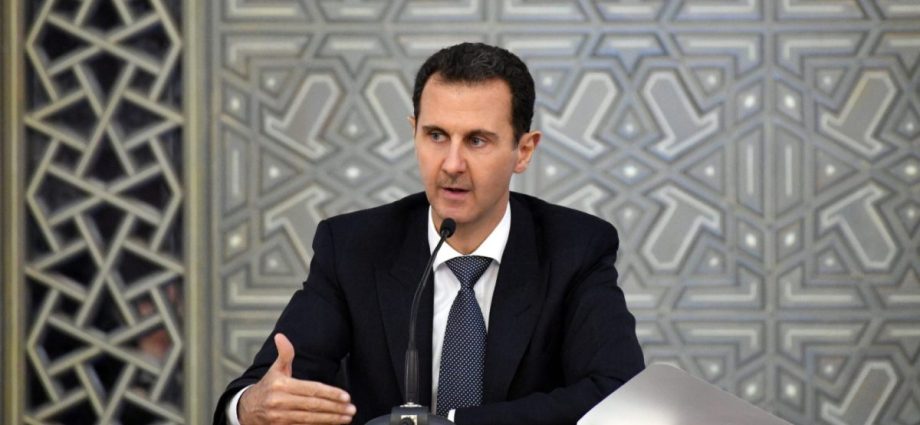
A recent move by the Syrian government to seize the assets of 35 accused smugglers has raised questions about President Bashar al-Assad’s intentions and regional strategy. Beyond the unusually high number of people targeted simultaneously, the profiles and affiliations of those under scrutiny are turning heads in Damascus and beyond.
The seizure made headlines when a leaked list of suspects surfaced this month. In addition to Mudallal Omar al-Aziz, a member of parliament, the dragnet included several militia commanders with extensive connections to the Assad regime and its ally Iran.
Among them are Firas al-Jaham, also known as Firas al-Iraqi, commander of the National Defense militia, and Hassan al-Ghadban, a notable leader in the Fourth Armored Division, which is led by Maher al-Assad, the brother of the Syrian president.
On the surface, the seizures appear to be a resolute stance against illicit financial activities.
The leaked document states that the individuals were targeted because of their involvement in smuggling goods worth a staggering 16.6 billion Syrian pounds (about US$2 million). The potential fines could top 100 billion pounds, underscoring the severity.
But scratch the surface and an ulterior motive for the seizures emerges. In addition to securing regional political gains, President Assad’s move seems to be part of a larger strategy aimed at extracting money from cronies who have neglected their financial obligations.
The timing of the asset seizures strongly suggests a desire by the regime to bolster its political position in the region, specifically with Iraq. All 35 of those targeted are from Deir Ezzor, a governorate on the Syria-Iraq border that is known as a prominent hub for trafficking activities, particularly in narcotics.
Coming shortly before a visit to Iraq by Syrian Foreign Minister Faisal Mekdad, the moves were part of the government’s proactive measures to address border security and drug trafficking.
Taking a strong stance on these issues is important for Assad’s relationship with Iraq, but also in meeting the regional requirements to reintegrate Syria into the Arab community.
After a meeting of Arab foreign ministers in Amman in May, Syria agreed to collaborate with Iraq in combating the drug trade.
Extortion campaign
But achieving geopolitical gains isn’t Assad’s only motivation. Since 2019, his regime has been extorting loyalist businessmen and war profiteers to pay its bills.
While Assad’s main supporters, Iran and Russia, were instrumental in helping the government prevail in the war, neither country has stepped in with enough financial support to help Syria emerge from its current economic crisis. As a result, the government has resorted to unconventional short-term tactics to keep its economy afloat.
Many of Syria’s business elites, particularly those who continued to operate during the conflict, have accumulated their wealth, directly or indirectly, through their connections to the government. With the war in essence won, Assad feels emboldened to call on them to help fund Syria’s recovery. Those who comply can continue their business activities as normal.
Those who refuse or fail to comply, however, face repercussions. They are either subjected to verbal threats or face punitive measures such as asset freezes on charges of tax evasion or corruption.
Prominent figures who have experienced shakedowns include Rami Makhlouf, Assad’s cousin, and Mohammad Hamsho and Wassim al-Qattan. But these extortion tactics have extended beyond high-profile individuals to include business owners and war profiteers at all levels.
In cases of alleged criminal activity, the government’s lack of interest in enforcing the rule of law is evidenced by its approach: Instead of facing the threat of imprisonment, those accused are merely required to pay fines. After targeted individuals fall in line, they typically return to operating as usual.
The most recent case is no exception. Most of the 35 people named in the leaked document have smuggled goods, oil and drugs between Syria and Iraq for years, and will likely continue doing so now.
The government doesn’t even seem worried about cutting off defendants’ access to wealth. Despite the widespread practice of using family members’ names to shield assets, none of those accused have been targeted in this way, suggesting that the seizures were more of a message than a genuine effort to end their illicit activities.
The evolving dynamics in Syria and its re-emergence from the cold will test regional allies in new and complex ways. Policymakers engaging with Assad must guard against seemingly innocuous policies and probe beneath the surface to understand the true motives behind his government’s actions.
This article was provided by Syndication Bureau, which holds copyright.
Follow Haid Haid on Twitter @HaidHaid22.

